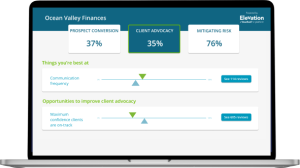Westminster Wealth has a simple but ambitious goal: to be the UK’s number one independent chartered financial planning firm. The firm has 60 advisers, managing just under £3 billion in client funds.
“We’re unlikely to be number one based on ‘number of advisers’,” says Martin Lockyer, managing partner at the firm. “We don’t have ambitions to get to a thousand advisers. We probably won’t be number one on total volume of funds either – that’s just not our MO.”
“[But] What our clients are saying about us is really important, because they’re the ultimate judge of us.”
This year, Westminster Wealth became the only firm to win two awards at the VouchedFor Client Experience Awards: Client Champion and Large Financial Advice Firm of the Year. Winning the awards felt particularly meaningful because the recognition came directly from client feedback data.
“It’s the first time I’ve been anywhere where the awards are absolutely data-driven,” Martin reflects. “There’s no subjectivity. It’s wholly based on client feedback, and I think that’s brilliant.”
The approach that sets them apart? Making client feedback the cornerstone of adviser development – transforming every piece of client insight into targeted coaching that drives both individual performance and firm-wide excellence.
From assumptions to actionable insights
Before adopting VouchedFor’s enhanced client survey, Elevation, Westminster Wealth relied on intuitive markers of success – like low complaints and minimal turnover – or anecdotal testimonials. “We always suspected these things were true,” Martin explains. “VouchedFor allowed us to know that they’re true.”
But the decision to collect client feedback consistently was an important step change, enabling the firm to help advisers identify and address specific gaps in their client relationships.
“We weren’t able to manage it effectively,” Martin continues. “The big difference is that now we can learn from our client feedback and embed it into our advice processes so that you overcome weak points, which every firm will have.”
Building feedback into the operational rhythm
Pete Summerbee, the firm’s T&C manager, embedded VouchedFor into the firm’s operational rhythm. Every Monday morning, advisers receive an email highlighting any feedback from the previous week, with clear guidance on what requires immediate action.
“We’ve broken the feedback down into must-dos and should-dos,” Pete explains. “If you see certain feedback, you must act upon it. Other feedback should be addressed at the next client interaction.”
The approach works because it’s built into every development conversation. “In every one-to-one meeting, we talk about VouchedFor feedback – what’s come through, what their view is, and how to be better.”
Regular feedback reviews brought to light a few unexpected opportunities. One of their most experienced advisers – someone with excellent client relationships and high trust scores – was scoring poorly on client understanding of fees. Despite clear evidence that fees were being discussed and disclosed, clients weren’t retaining the information.
“His clients were so relaxed and trusting, they’d almost stopped listening,” Martin recalls. “So he changed his approach to reconfirm things at the end of every meeting.”
The transformation was immediate. The adviser went from having some of the poorest scores for fee understanding to having clients who understood fees better than anyone else in the firm.
Building a culture of improvement
What makes Westminster Wealth’s approach distinctive is how they’ve positioned feedback as a development tool rather than a performance measurement. This has won over even their most experienced advisers.
“We’ve got individuals who’ve been at this for over 30 years,” Martin notes. “It’s not atypical for our profession to be resistant to change. Yet those people are some of the most passionate advocates for VouchedFor because they’ve seen how it’s highlighted gaps in their relationships with clients.”
Westminster Wealth is one of the only firms who have specific adviser KPI around responding to feedback. The firm uses KPIs focused on responsiveness rather than scores. If an adviser receives red flag feedback, they have between four and eight weeks to address it with the client. As long as they close the loop, they achieve their KPI.
The business impact
The focus on systematic feedback has delivered tangible business benefits. The firm uses their ratings and recognition to support natural enquiry generation, and their high scores help potential clients pre-qualify before initial meetings.
“People can see we’ve got whatever our rating is [4.8 stars] and that helps the transition from new lead to appropriate adviser become much more seamless,” Martin explains.
Perhaps most importantly, the feedback system is helping with succession planning. When their first adviser retired in January, transferring 100 families to new advisers, the systematic feedback process helped ensure a smooth transition.
The bottom line
Westminster Wealth’s success demonstrates that systematic client feedback doesn’t have to be another compliance burden. When embedded properly into business operations, it becomes a powerful tool for continuous improvement, adviser development, and business growth.
As Martin puts it: “Unless you measure it, you can’t take action. The quicker we know what the state of play is, the quicker our businesses become better and more valuable.”
Their advice to other firms is simple: be unafraid of what you might discover. Whether the feedback is positive or negative, it represents the current state of your client relationships. And you can only improve what you’re willing to measure.




